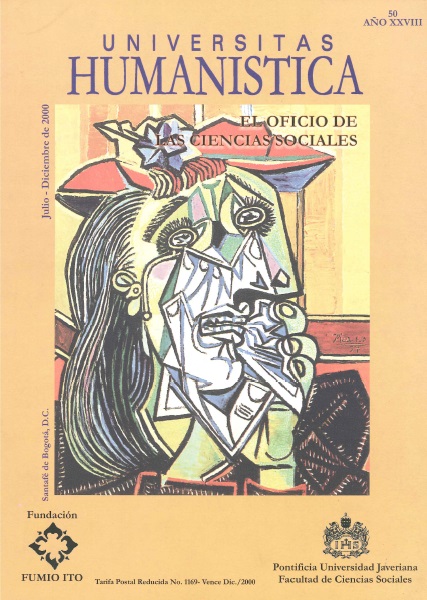Abstract
Hace algún tiempo señalamos que la producción narrativa de Roberto Burgos Cantor entre 1980 y 1992 -Lo Amador, cuentos, 1980; El Patio de los vientos perdidos, novela, 1984;Zte Gozos y desvelos, cuentos, 1987 y El Vuelo de lapaloma, novela, 1982, constituye un sólido universo textual alrededor de un foco recurrente de atención: el momento en que la Cartagena de mediados del siglo XX se ve arrasada por un vertiginoso y desigual proceso de modernización con la consecuente pérdida de rumbo y el debilitamiento de la identidad, aquél en el cual se está desmoronando o ése en que empieza a desdibuj arse para sumirse en el caos. Frente a tales movimientos desestabilizadores, los textos de Burgos en diversas intensidades, sugieren la posibilidad de un rescate imaginario de Cartagena a través del poder fundante de una escritura, que si bien algunas veces sólo constata ausencias o duda de su mismo poder restablecedor, en otras recupera memoriosamente un imaginario a partir de una poética de la espacialidad, la cual identifica un entorno, revalora una realidad socio-cultural o dignifica una condición humana para que sea posible afirmarse en el cambio sin perder el piso ni el sentido de pertenencia.

This journal provides immediate open access to its content on the principle that making research freely available to the public, encourages greater global exchange of knowledge.
The journal Universitas Humanística is registered under a Creative Commons Attribution 4.0 International Public License. Thus, this work may be reproduced, distributed, and publicly shared in digital format, as long as the names of the authors and Pontificia Universidad Javeriana are acknowledged. Others are allowed to quote, adapt, transform, auto-archive, republish, and create based on this material, for any purpose (even commercial ones), provided the authorship is duly acknowledged, a link to the original work is provided, and it is specified if changes have been made. Pontificia Universidad Javeriana does not hold the rights of published works and the authors are solely responsible for the contents of their works; they keep the moral, intellectual, privacy, and publicity rights.
Approving the intervention of the work (review, copy-editing, translation, layout) and the following outreach, are granted through an use license and not through an assignment of rights. This means the journal and Pontificia Universidad Javeriana cannot be held responsible for any ethical malpractice by the authors. As a consequence of the protection granted by the use license, the journal is not required to publish recantations or modify information already published, unless the errata stems from the editorial management process. Publishing contents in this journal does not generate royalties for contributors.


